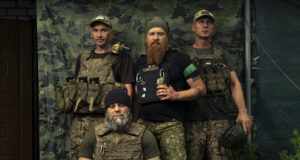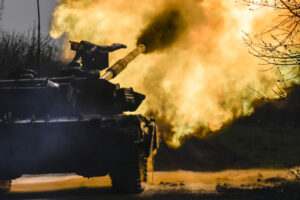At an otherwise newsy event last month, Jens Stoltenberg, the Nato chief, made a low-key administrative announcement: “We are working on a multi-year package with substantial funding…”
Not the stuff of headlines, but a rather sobering admission that, as the war approaches its 500th day tomorrow, there is no end in sight. Not this year, or next year or the year after. That should be deeply concerning, especially because, contrary to received wisdom, all those who really matter — the Ukrainians, Russians and the Americans — are actually trying very hard to end it.
For it is not true, contra widely held opinion, that Zelenskyy wants the world to support him forever as he completes a full Reconquista — including Crimea. His current offensive — the push towards the Black Sea to cut off Russian forces further west – is a clear demonstration of this. It was deliberately calculated to push Moscow to the negotiating table or risk losing tens of thousands of soldiers to captivity or death.
But Zelenskyy has consistently refused to spell out the fact that he has a “limited aim” of reaching a negotiated peace without Crimea. And he has done so for both military and personal reasons.
The military reason is straightforward and common to every war: to advance at all, Ukrainians on the front line cannot fight in a “limited” way. They must believe that their absolute commitment and self-sacrifice can end the war in victory.
The personal reason is that Zelenskyy is a Jew, as is his defence minister, Oleksii Resnikov. And like the countless Jews who fought for their countries up and down Europe in the last century, the pair remain suspect in the eyes of the Ukrainian ultra-nationalists who are commonly antisemitic.
It is, for them, no small irony that Ukraine should be led in its struggle for existence by two Jews since its founding hero, Bohdan Khmelnytsky, was Hitler’s only predecessor as a genocidally-antisemitic national leader; but instead of opprobrium, he has a city, a region, countless streets and Zelenskyy’s own Presidential Guard brigade named after him. Given the nationalists’ bigoted mistrust of the president, in spite of his stellar leadership from the first night of war, he cannot be seen to be a compromiser.
But, that’s just the subtext. Like everybody else who matters, Zelenskyy knows only too well that the war must end in a negotiation because nobody is going to march on Moscow to force the Russians to surrender. Talk of “regime change” may offer a seductive promise for some, but it mostly demonstrates a feckless over-optimism about its feasibility, while also ignoring the likelihood that Putin’s replacement will promise not peace but a more effectively prosecuted war. Prigozhin was applauded so enthusiastically in Rostov precisely because he called to fire the losers still charge; the Russians want generals who can march to Kyiv as Zhukov marched to Berlin in 1945. But that the Russians can keep on bombing Ukraine’s cities day after day, however sporadically and uselessly, is one more incentive for a ceasefire that will not be delayed by any dreams of Crimea.
Right now, Ukraine’s forces lack the power for a rapid march to the sea and suffer from equipment shortcomings. After finally obtaining German Leopard tanks, it turns out that Russia’s Kornet anti-tank missiles are truly excellent: neither the Leopards in the field nor the M.1 tanks promised by the US will do well against them. But even if this offensive cannot be truly successful, Ukraine’s strength is clearly rising which should be enough to push Russia to the negotiating table. For, just as Zelenskyy is wrongly accused of refusing a ceasefire because he wants too much, so, too, is Putin.
Yes, it is perfectly true Putin started the war determined to conquer Ukraine in less than a week, armed with the marvellously advanced “post-kinetic” war plan — all the rage in the US too —devised by his military chief, Valery Gerasimov. But from the bitter February morning when Putin discovered that Gerasimov and his FSB internal-intelligence chief — along with US, French and German intelligence — were utterly wrong, Putin has refused both of the alternatives available to him. The first was what to do what many believe he did last year: decide to fight in earnest. For that he would have had to declare war, and mobilise his two million reservists to invade with overwhelming military force, as opposed to Gerasimov’s for-show-only advance of 150,000 (including field dentists).
So why didn’t he? Certainly not because he feared nuclear retaliation — Chancellor Olaf Scholz had just declared that Germany would not even delay the planned opening of the Nord Stream 2 gas pipeline if Ukraine were invaded, let alone support Nato nuclear retaliation with the bombs stored on German soil. And Washington gave up long ago on “extended deterrence”, whereby nuclear weapons would be used in response to conventional attacks against US allies, let alone non-ally Ukraine.
But Putin did fear something just as powerful. Every Russian army unit, except for the fully professional airborne forces, includes 18- and 19-year-old conscripts, whose mothers would swiftly take to the streets across Russia and flood Red Square to vehemently protest if there were any more than a handful of casualties. Modern Russia is just as “post-Heroic” as any other low-fertility country where there are no spare male children to sacrifice for the nation’s glory (China has fewer than most). And Putin was not about to declare war and have his police battle Russia’s mothers. He not only refused to mobilise the Russian armed forces, he even banned the word “war” (война, or voyna) from all official communications.
But neither would Putin just call it all off, blame the Kyiv assault on “neo-Nazi” provocations and quickly retreat. So instead of all-out war or no war, Putin has persisted with his “special military operation”, revealing in the process to the entire world that Russia does have something that no other country still has: full self-sufficiency. Unlike China, the Russian Federation is autarkic in food and fuel, and manufactures all that is needed to sustain its armed forces and civilian population on a war footing, even if they are short of a few luxuries. So all Putin needed to keep fighting till his enemies lost patience was manpower, and to keep his conscripts out of combat.
He also has roubles — which he is wielding. Right now, joining the Russian army earns one a ₽600,000 sign-up bonus, ₽204,000 a month ($2,296 today), and stellar death benefits: ₽5,000,000 from the President himself an additional 2-3 million from the regional government and a monthly widow’s pension of ₽25,000 a month. Enough have joined to provide the forces that dug and fortified the long trench lines now holding up Ukraine’s offensive, along with almost 200,000 of the recalled reservists, who get the same pay and benefits.
And there are still more newly enrolled Russian troops in the east, and in the formerly independent state of Belarus (the country that, in all but name, Putin did conquer last year). But while Putin could keep up a war of low-level attrition for a while, it cannot lead to victory. And now he has Elvira Nabiullina to contend with.
Nabiullina is the formidable head of Russia’s Central Bank. Already very highly respected before the war, she is now the hero of Russian public finance for having successfully controlled inflation — better, in fact, than the Bank of England or the US Federal Reserve. The word is that she is tapering the printing of roubles, not for fear of a greater national debt (Russia’s is much lower than that of the US or UK) but of inflation. For Putin, too, that is a greater threat than anything his troops can encounter on the battlefield. Inflation will quickly drown Russia’s poor, many of whom are scattered across the endless steppe of Russia with very few opportunities to earn their way around rising prices.
These Russians also happen to be Putin’s firmest supporters. That is why unmistakable signals have issued from the Kremlin that Putin is finally ready to consider a compromise. The final party longing for an end to the debacle is the US. Last week, CIA head William J. Burns hurriedly called his Kremlin counterpart, Sergey Yevgenyevich Naryshkin, to reassure him that the US had nothing to do with Prigozhin’s march to Moscow. That phone call is as good as evidence as any that, contrary to foolish Leftist fantasies, the Biden administration (fully backed by most Republicans) does not want Russia destabilised by this war. For it knows only too well that Russian power alone keeps the Chinese from absorbing the vast spaces of Mongolia, Kazakhstan, the Kyrgyz Republic, Uzbekistan and Tajikistan — and that Russian weapons still flow to the only countries that actually fight the Chinese in recurring incidents: India on land and Vietnam at sea.
So here’s our paradox. Even though all three key parties want to end the war, the fighting still continues. Why? Because of a virtue that is also a sin. The Ukraine war is not an all-out war like the First or Second World Wars. It is a “limited war”, with US and Russian embassies still functioning in Moscow and Washington, US and Russian astronauts sharing space capsules, concerned phone calls by the CIA director when Moscow is briefly in turmoil. It is bound by reciprocal restraint. The Russians do not attack US aircraft and vessels bringing weapons to their enemy, the Americans do not supply weapons to Ukraine that can attack Russian cities. Putin himself has silenced threats of nuclear attacks by Russian hotheads, declaring that he would only use nuclear weapons if Russia were faced with imminent destruction — that is, inevitably, nuclear destruction.
In other words, the good news is that the Ukraine war is, a polite, “limited war”, just like those of the 18th century that were later envied in the terrible 20th century of all-out, unlimited wars. But the bad news is that as long as only the Ukrainians are under fire, none of the other protagonists has an impellent reason to end the fighting. So like the 18th-century Seven Years’ War, it risks dragging on for at least another 500 days.
Disclaimer
Some of the posts we share are controversial and we do not necessarily agree with them in the whole extend. Sometimes we agree with the content or part of it but we do not agree with the narration or language. Nevertheless we find them somehow interesting, valuable and/or informative or we share them, because we strongly believe in freedom of speech, free press and journalism. We strongly encourage you to have a critical approach to all the content, do your own research and analysis to build your own opinion.
We would be glad to have your feedback.
Source: UnHerd Read the original article here: https://unherd.com/



